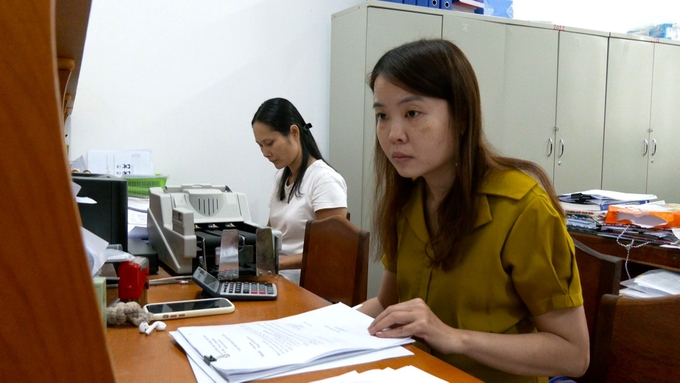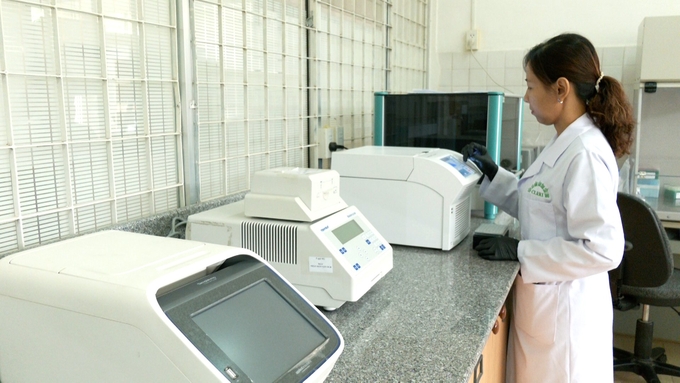November 25, 2025 | 21:40 GMT +7
November 25, 2025 | 21:40 GMT +7
Hotline: 0913.378.918
November 25, 2025 | 21:40 GMT +7
Hotline: 0913.378.918
Characteristically being an in-depth scientific research unit, to improve operational efficiency and increase competitiveness, in the past 10 years, Cuu Long Delta Rice Research Institute has begun to arrange and streamline its administrative apparatus, especially in the context of the Institute entering a period of autonomous operation.

Dr. Nguyen Thuy Kieu Tien, Deputy Director of Cuu Long Delta Rice Research Institute, said that in the past 10 years, the Cuu Long Delta Rice Institute has arranged and streamlined its administrative apparatus. Photo: Kim Anh.
Sharing about the difficulties in the early days of establishment, Dr. Nguyen Thuy Kieu Tien, Deputy Director of Cuu Long Delta Rice Research Institute, confided that every time the Institute receives an incoming or outgoing dispatch, it takes a lot of time. In some cases, the dispatch just received has expired, significantly affecting the progress and quality of the Institute's work.
Furthermore, with a substantial volume of scientific research topics and works. Meanwhile, the process of managing records and papers, in the beginning, was mainly manual, leading to easy loss. Especially when moving infrastructure from one room to another. Furthermore, it is also challenging to search for records stored 4-5 years ago. "The Institute's annual research projects are substantial. At one point, due to insufficient storage space, they were forced to be canceled," Dr. Kieu Tien said.
Facing the rapid development of information technology, Cuu Long Delta Rice Research Institute focuses on reforming all stages related to administrative procedures from record-keeping, streamlining the apparatus, and accounting... Dr. Kieu Tien acknowledged that up to now, the reform of administrative activities cannot be said to be the most complete. Still, it has created significant advantages in operations for the staff of Cuu Long Delta Rice Research Institute. Currently, the Institute is promoting coordination with several units to develop internal management software, further progressing in administrative work.

Cuu Long Delta Rice Research Institute currently has 2 functional departments, 4 research departments, 3 production and service centers, with a scale of 140 - 150 staff. Photo: Kim Anh.
Dr. Kieu Tien assessed that before 2010, the total number of staff at the Institute amounted to 220 - 250 people. With a rather cumbersome operating apparatus of up to 15 units under the Institute, it causes many difficulties in directing, operating and managing activities.
Currently, Cuu Long Delta Rice Research Institute has reorganized and streamlined its apparatus with 2 functional departments, 4 research departments, 3 production and service centers. This approach has facilitated the direction and management of activities and professional coordination among affiliated units, while the number of Institute staff is kept at a scale of 140 - 150 people.
Dr. Mai Nguyet Lan, Deputy Head of the Department of Agronomy - who has worked and been attached to Cuu Long Delta Rice Research Institute for over 15 years, said that compared to the early days of the Institute, there have been apparent changes in practice reform and provide great support to Institute staff in the process of performing their professional duties. Previously, the Institute contracted each staff member to carry out experiments, but now, the Institute has implemented reforms, establishing specialized field management teams for all experiments. From there, the officer in charge has time to focus on technique so that the experiment achieves the best and most optimal results.
The robust application of information technology and bioinformatics in rice breeding is also a bright spot in the reform of scientific research activities of Cuu Long Delta Rice Research Institute. Technical advances contribute to predicting hybrid pairs and offspring, bringing the best research efficiency.

Applying bioinformatics technology to rice breeding is also a bright spot in the reform of scientific research activities of Cuu Long Delta Rice Research Institute. Photo: Kim Anh.
Dr. Kieu Tien analyzed that in the past, to breed a rice variety successfully, researchers had to select and create about 100 hybrid combinations to produce a satisfactory hybrid combination. Besides, the time from the beginning of cross-breeding until the development of a new rice variety is up to 10 years.
Currently, the robust application of bioinformatics technology in research activities can help experts predict and shorten time. Only 30 - 50 hybrid combinations can be produced and analyzed for the combining ability of a rice variety. Therefore, the breeding time can be shortened to within 5 years, reducing the number of hours and labor.
The goal of administrative reform in the scientific sector at the Rice Institute is to follow the motto "The best research project with the least total investment of resources and time." To ensure the above goal, it is required that the staff and experts of the Rice Institute be thoroughly and intensively trained to keep up with technology, bringing higher and faster efficiency.
According to statistics from Cuu Long Delta Rice Research Institute, the unit currently has 30 staff with doctoral degrees and 50 - 60 masters who have been appropriately trained in many countries worldwide. With this team of human resources, Dr. Kieu Tien affirmed that the ability to grasp technology completely meets research requirements.
In the context of many units competing in rice breeding, to continue affirming its position as the leading research unit in the Mekong Delta, the Rice Institute focuses on two factors. The first is to create quality products that meet production and market requirements. Next is to grasp technology, improve research skills, and shorten product creation time.
Cuu Long Delta Rice Research Institute has the advantage of owning a rich gene bank, with about 4,000 rice varieties collected over many generations. Including local seasonal rice varieties in all Mekong Delta provinces, wild rice varieties, high-yield rice varieties... Including genetic resources imported from abroad, the International Rice Research Institute (IRRI), and other partners. That is the strength when the Institute exploits the traits and advantages of rice plants to create quality products.
Translated by Tuan Huy

(VAN) Deputy Minister Nguyen Quoc Tri emphasized the determination to prevent violations at CoP20, sharing enforcement results and commitments to strengthen cooperation with the international community in the coming period.

(VAN) In addition to strengthening the relationship between schools and enterprises, the Aus4Skills project expands opportunities for female students and people with disabilities to work in the transport and logistics sector.

(VAN) Nghe An is preparing policy, technical, and resource steps to participate in the forest carbon credit market.
/2025/11/25/1648-2-110733_532.jpg)
(VAN) From 2011 to 2023, Ca Mau province lost approximately 6,200 ha of coastal land and protection forests due to erosion, threatening many residential areas, infrastructure facilities, and production zones.

(VAN) Quang Ngai holds strong potential for carbon credits but needs a clear legal and policy framework to secure sustainable revenue from this resource.

(VAN) With its diverse ecosystem, Phu Quoc National Park plays a vital role in environmental protection and biodiversity conservation and serves as the core zone of the Kien Giang World Biosphere Reserve.

(VAN) Cooperation activities under the Aus4Skills program focus on: logistics professional development, competency-based training and assessment (CBTA), leadership innovation, and digitalization.